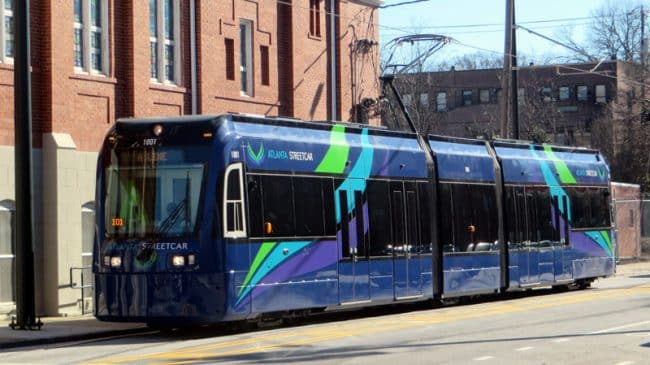Atlanta has recently joined several dozen other U.S. cities by opening a streetcar line. With critics already pointing out that, for many trips, taking the 2.7 mile streetcar is slower than walking, the big question now is whether Atlanta will join the ranks of cities experiencing a well-justified backlash against this 19th-century form of transportation.
Last November, after voters in Arlington County, VA, elected an anti-streetcar candidate to the county board two planned streetcar lines were cancelled. The two projects would have cost a total of $550 million.
It was a wise decision. That $550 million in transit money could do a lot more good – i.e., provide far greater transportation value – by improving the local bus system.
Not far from Arlington, The Washington Post was editorializing against planned streetcar lines in Washington, DC, with the headline “D.C. Should Hit the Brakes on Any Streetcar Expansion.” The Post cited the many start-up problems experienced by DC’s initial 2.2-mile line on H Street, for which the track is in place and testing has begun – the line overlaps well-used Metrobus routes and will impede travel by buses as well as cars. If the two additional streetcar lines currently planned are built, the cost of the three short lines would exceed a billion dollars. The editorial asked, “whether the District should take on a money-losing operation, given the investments that will be needed in the Metro system.” The city’s new mayor, elected last November, has promised to reevaluate the streetcars project.
As Eric Jaffe noted in CityLab, good public transportation requires frequencies of every 10 or 12 minutes. None of the “modern” streetcars come close to the historic St. Charles line in New Orleans that runs every 9 minutes during its morning peak, every 8 minutes at midday, and every 10 minutes in the evening. Urban planner Yonah Freemark has pointed out that most of the streetcar lines opened since 2000 in places like Dallas, Portland, Salt Lake City, Seattle, and Tampa, don’t even meet the bare minimum of four trips per hour during morning and evening peak times. (Atlanta’s streetcar is meeting this minimum standard of 15 minutes.)
As in Atlanta, streetcar advocates increasingly argue for them based on their alleged economic development benefits. There is very little evidence that streetcars alone can jumpstart economic development of an area, but to the extent that they do provide such benefits, streetcars should be funded from economic development budgets, not transit budgets.
For the same $500 million or $1 billion that it takes to build a handful of short, slow streetcar lines, a city like Atlanta could make major improvements to its bus system: increasing frequencies on popular routes, adding limited-stop express buses, adding more bus pull-outs, equipping more bus stops with shelters, and providing real-time next-bus information at bus stops. Those kinds of improvements would improve transportation for the large majority of transit customers who take the bus.
Metro Atlanta’s transit systems leave much to be desired. A Brookings Institution study found that only 3.4 percent of metro Atlanta-area jobs are reachable by transit within 45 minutes. And only 22 percent are reachable by transit within a whopping 90-minute one-way commute trip.
Improving the metro area’s bus transit systems – the only available transit mode for the vast majority of commuters – should be transit planners’ top priority, not trendy streetcar lines.
Transportation and mass transit budgets will always be limited. Therefore, it is incumbent on transit planners to get the most transit benefits out of every dollar they spend. “Modern streetcars” do not do that.
Robert Poole is director of transportation at Reason Foundation. This article originally appeared in The Atlanta Journal-Constitution.

